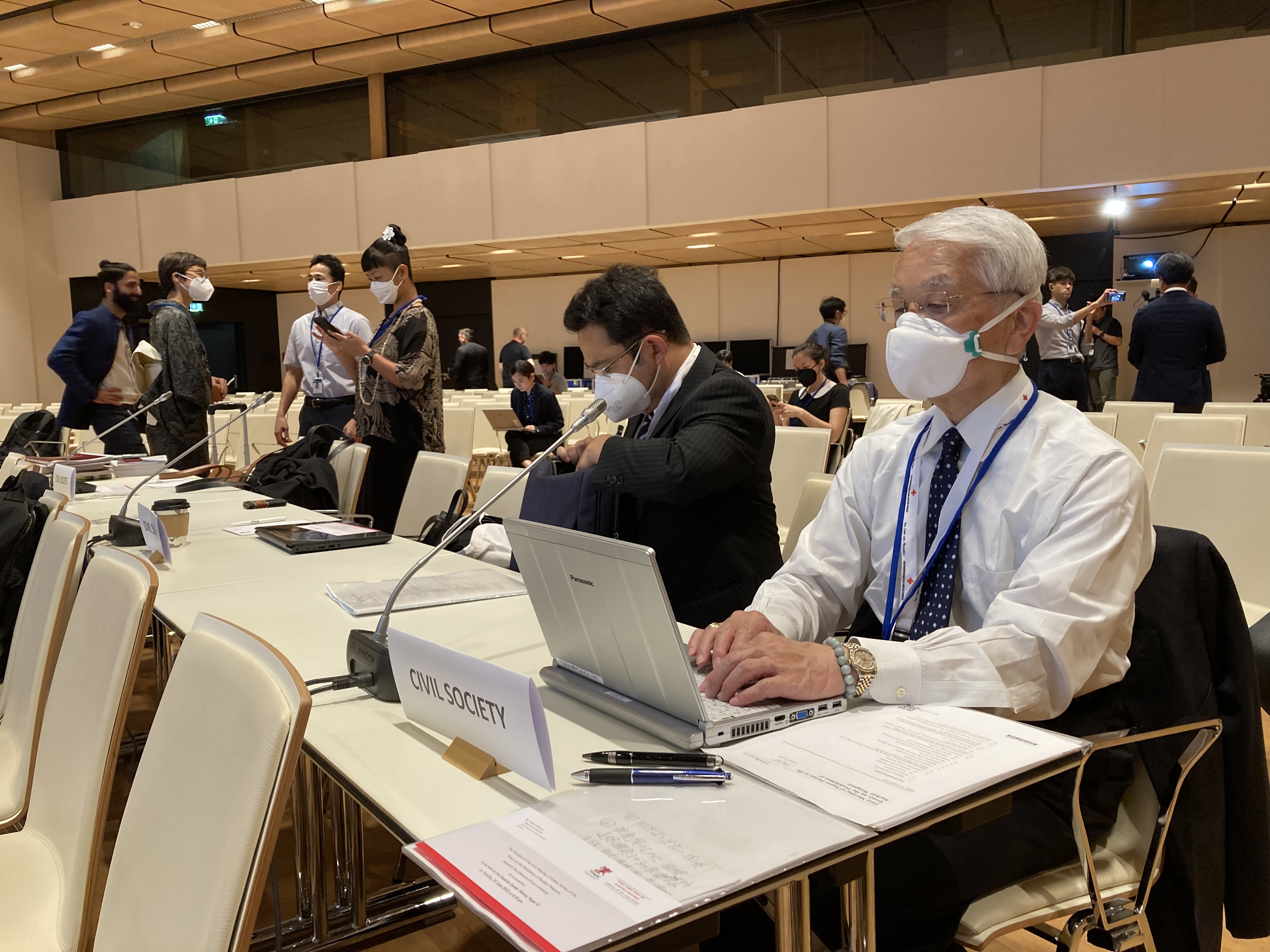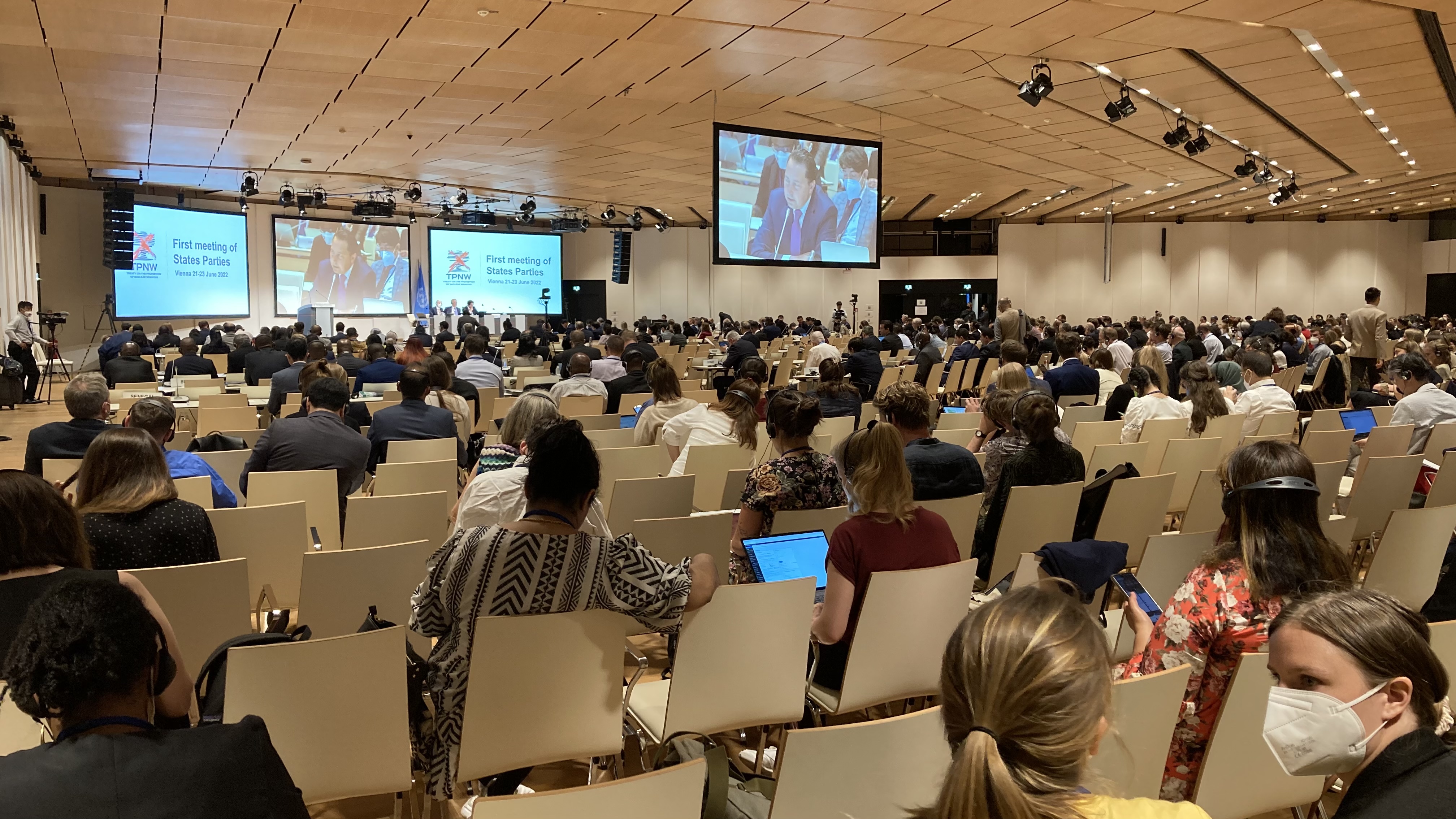The historic first Meeting of State Parties to the Treaty on the Prohibition
of Nuclear weapons took place in Vienna, Austria, in late June. The Meeting
adopted a political declaration and an action plan to set the course of
the Treaty’s implementation and progress toward its ultimate goal of total
elimination of nuclear weapons.
49 States Parties attended the Meeting, with 34 States participating as
observers. Eighty-five non-governmental organizations also observed the
Meeting without the right to vote.
WCRP/RfP Japan sent a delegation to participate in the Meeting as an observer.
One of the delegation members, Rev. Masamichi Kamiya, reported the discussions
and the outcome of the Meeting.


Rev. Kamiya observed the Meeting as a member of the “Stop! Nuclear reliance
Task Force” at WCRP/RfP Japan.
Against the backdrop of the Russian invasion of Ukraine, the Declaration
expressed grave concern on the threat of nuclear weapons usage, saying
that “nuclear weapons are used as instruments of policy, linked to coercion,
intimidation, and heightening of tensions.”
Rev. Kamiya put significance to the following sentence included in the
Declaration. “This highlights now more than ever the fallacy of nuclear
deterrence doctrines, which are based and rely on the threat of the actual
use of nuclear weapons and, hence, the risks of the destruction of countless
lives, of societies, of nations, and of inflicting global catastrophic
consequences.”
“This sentence states that the nuclear deterrence policy is completely
wrong. I think this is a clear message we must note,” Rev. Kamiya wrote
in his report.
The Action Plan touches on the issue of assistance to the victims of atomic
weapons. Rev. Kamiya found this approach is quite essential and impressive
not only from the humanitarian and ethical point of view but from the human
security point of view.
He focused on “Action 29” in Chapter III (Victim assistance, environmental
remediation, and international cooperation and assistance (Articles 6 and
7), which calls for a consideration of “establishing an international trust
fund for states that have been affected by the use or testing of nuclear
weapons.”
Rev. Kamiya suggested that WCRP/RfP Japan may “consider offering donations
to such an international trust fund” to commit itself more actively to
assisting the victims of nuclear war and nuclear weapon experimentations.
“Extending helping hands not only to the victims of the atomic bombings
of Hiroshima and Nagasaki but also to the South Pacific islanders and those
who live near nuclear test sites such as Semipalatinsk in Kazakhstan is
an integral part of the task for us who are involved in the movement for
the abolition of nuclear weapons. We can’t ignore the suffering of those
people which are continuing,” Rev. Kamiya said
As a final analysis, he argues that,
- It’s true that nuclear arms reduction is primarily a task of sovereign
governments. However, non-governmental organizations such as WCRP/RfP have
enormous means to contribute to the ultimate goal of a nuclear-zero world.
One area is advocacy. WCRP/RfP is requesting the Japanese government to
remove nuclear deterrence policies again and again. Such activity may not
reduce the nuclear warheads but shall be considered a legitimate and practical
work of the movement to eliminate nuclear weapons.
- The assistance to the victims of nuclear war and nuclear arms experimentation
is an integral part of the movement. The international community must cooperate
in this area.
- Nuclear disarmament has been a central issue for WCRP/RfP since its inception
in 1970 in Kyoto, Japan. Now that we have a treaty to legally ban countries
to “develop, test, produce, manufacture, otherwise acquire, possess or
stockpile nuclear weapons or other nuclear explosive devices,” (Chapter
1a), we at WCRP/RfP must double our effort to walk on the broad way to
achieve our goal.
- In a closing statement of the Meeting, Ambassador Alexander Kmentt of
Austria called for the participants to grow the new-born Treaty together.
His message was aimed at state parties and civil society working on nuclear
reduction. Throughout the whole process of this Treaty, from the beginning
of negotiations to the ratification, governments and civil society have
been working together with the shared view of making nuclear elimination
a reality as early as possible. This process has shown a new paradigm of
cooperation between them.
- In the preamble, the Treaty stresses “the role of public conscience in
the furthering of the principles of humanity as evidenced by the call for
the total elimination of nuclear weapons, and recognizing the efforts to
that end undertaken by the United Nations, the International Red Cross
and Red Crescent Movement, other international and regional organizations,
non-governmental organizations, religious leaders, parliamentarians, academics,
and the hibakusha.” The mentioning of “religious leaders” is another proof
that they are essential partners, and driving forces, in achieving the
goal of the nuclear free world. The Meeting made me convinced that.
Before the Meeting, the WCRP/RfP Japan delegation participated in two side
events. One was the “Nuclear Ban Forum” hosted by ICAN, and the other was
“The 2022 Vienna Conference on the Humanitarian Impact of Nuclear Weapons”
organized by the government of Austria, both of which took place in Vienna.
In a separate interview, Rev. Kamiya summed up his thoughts. “
“Until now, I have been focused on the inhumanity of nuclear weapons because
if they were used even once, humankind would face tragic consequences.
However, after attending the three programs, I gained a new perspective.
When we think about the danger of nuclear weapons, we must consider not
only the inhumanity but also the “nuclear risk” that would cause enormous
damage in various areas on a global scale, such as health damage, extreme
weather, environmental pollution, food shortages, and collapse of social
infrastructure.
“A nuclear explosion anywhere in the world would generate global consequences.
Inhumanity and nuclear risks must be considered integral parts of the nuclear
threat.
“Many government officials and scientists stressed the importance of dialogue.
As long as countries and peoples have different positions and thoughts
about nuclear weapons, the only way to find common understanding and interests
is through multiple dialogues. This philosophy is consistent with a longstanding
commitment of WCRP/RfP. I am convinced that WCRP/RfP can show the world
a fundamental philosophy toward the abolition of nuclear weapons.
“Towards the abolition of nuclear weapons, it is important to enlighten
people not only from religious aspects such as morality and ethics but
also from an objective viewpoint based on scientific knowledge, saying,
“Nuclear weapons threaten your life to this extent.” I find it a huge responsibility
as a religious leader. We will continue to expand the channels of dialogue
held by WCRP/RfP Japan and double our efforts to realize a world free of
nuclear weapons.”
Mr. Takashi Hashimoto, another representative of WCRP/RfP Japan, was impressed
by a dialogue between the representatives from Iran and Israel. Both introduced
their activities aimed at a nuclear reduction at a workshop in the Nuclear
Ban Forum hosted by ICAN.
“Members of the two delegations were hailing each other for their work
on peace. I felt that the citizens share the common aspirations for peace
even though they live separately in two confronting nations. I reaffirmed
the importance of reaching out to people and governments through grassroots
activism,” he said in an interview.
Ms. Hiroyo Murayama, another delegation member, recognized that nuclear
weapon victims are worldwide. “At the Vienna Conference on the Humanitarian
Impact of Nuclear Weapons, representatives from countries like Australia
and Kazakhstan, where the nuclear arms experiments were conducted, made
speeches showing pictures of the test sites. Japan has been appealing for
peace as the only A-bombed country in war. I think it is going to be important
for Japan to raise its voice with nuclear victims worldwide,” she said
in an interview.
Ms. Murayama also noticed that young Japanese were present at Vienna conferences.
“They were reporting actively through social media. I will increase my
effort for open and polite communication,” she concluded.
